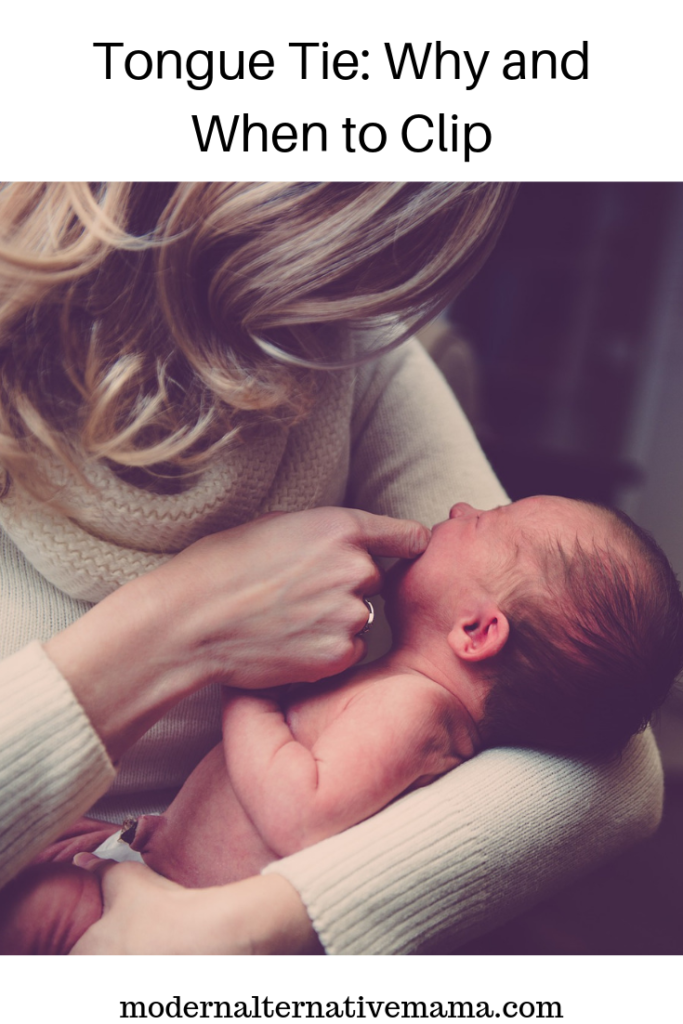By Danielle, contributing writer
It seems like tongue ties have been on the rise lately and are often blamed as the cause of breastfeeding issues. Although physicians who are trained are finding many ties, and they do cause issues, that may not mean that the tie should be clipped.
What is a tie?
A tongue tie, called a ankyloglossia, is when the tissue holding the tongue to the floor of the mouth (the lingual frenulum), does not allow full motion of the tongue. Likewise, the lip can also be tied where the upper lip meets the gums. This may cause a shallow latch, and lead to poor milk intake.
Later in life, it is also known to possibly cause speech issues, irregular tooth formation and decay, and difficulty swallowing.
Does a tie cause issues?
Most women learn about tongue or lip ties when they breastfeed their first child. If it’s painful, a tie may be to blame. A severe tie can be clipped, giving the baby more range of movement with the tongue or lip. This may allow a better latch.
This procedure used to be solely done with a knife, but now most dentists or pediatricians complete it with a laser. The parent is then instructed to do exercises with the baby’s tongue for a month or longer. Typically, there are follow up appointments to ensure the tie has not reattached.
Side note: If you, or a loved one, are delivering your first baby, I highly suggest considering getting a lactaction consultant. Breastfeeding, after pregnancy and delivery, is a bit of work to learn (especially when you are tired), and early learning is key to a long, healthy nursing relationship.
Physicians are seeing ties in record numbers. This study found that out of 200 infants reviewed, 199 had some form of tie. However, there are 4 varying degrees of tie, and not all produce any ill effects. Therefore, the choice to clip or not is not cut and dry, it must be considered on a case-by-case basis.
Why to Clip a Tongue (or Lip) Tie
A tie may severely inhibit the baby’s ability to intake a proper amount of milk. If that’s the case, clipping the tie, should be considered. It may also cause severe breastfeeding pain in the mother, also shortening or stopping altogether the breastfeeding relationship. In both of these cases, it is best to consider clipping a tie.
It’s also commonly accepted that ties may cause reflux, gas, colic, and speech delays even into the years after birth.
Tongue and lip ties are classified in severity, ranging from 1 to 4.
Class 1 ties are attached on the very tip of the tongue. These are the most severe ties.
Class 2 ties are a little further behind the tip of the tongue.
Class 3 ties are closer to the base of the tongue. Classes 1, 2, and 3 are also known as anterior ties.
Class 4 ties, also known as posterior ties may be under the mucous membrane covering. These must be felt to be diagnosed, and many are misdiagnosed as having a short tongue.
The baby may have an undiagnosed tie if:
- Unable to or shallow latch
- Clicking sound when feeding
- Popping on and off the breast often
- Fussy at the breast
- Feeding extremely often
- Low weight gain
- Colicky
The mother may be showing signs of a tongue-tied baby if:
- Pain when feeding or damaged nipples
- Wedge-shaped nipples after feeding
- Low or above average milk supply
- Engorgement or mastitis
When to Clip a Tongue (or Lip) Tie
If you suspect a tie, first book an appointment with a lactation consultant to see if your baby simply has a poor latch, or if you are breastfeeding accurately. Many lactation consultants can spot a tie, and refer you to a physician who can clip it in your area (to find one, look through La Leche League).
After you have resolved any possible breastfeeding issues, and you still have pain when breastfeeding or the baby has typical tie symptoms, it may be time to consider clipping. Likewise, if your child exhibits speech delays, tooth issues, or difficulty swallowing, but did not have feeding issues, you may consider getting the tie evaluated to see if it is the cause of these issues.
To be clear, you do not need to clip, or “reverse,” a tongue or lip tie if there are no issues breastfeeding.
Finally, if you do decide to clip the tie, you should heavily research the physicians in your area. Local breastfeeding moms, mom groups, and lactation consultants can let you know who is the best. Second, be sure to do the exercises, even though they are uncomfortable, so that the tie does not reattach.
What to Expect When you Clip a Tie
A frenotomy physician will evaluate the tie before completing the procedure, and ask the mother some questions. A topical pain-numbing cream is normally applied before the procedure. The baby is swaddled, the mouth opened, and a laser cuts the excess tissue. The procedure lasts about a second when done with a laser.
Breastfeeding is encouraged immediately after the procedure to clean the wound, provide comfort, and get the tongue moving as soon as possible. The physician will demonstrate the exercises to stretch the area and ensure it does not reattach. It is very important to do the exercises daily. A follow up appointment is booked for the physician to review if the tie reattaches.
A possible side effect is excessive bleeding, though very rare. Some discomfort may last 1-2 days, and arnica (dissolved in water) is advisable. Most moms notice a difference in feeding in 1-2 days, however, it may take up to one month. Keep working with a lactation consultant until you and your baby get a perfect latch.
A tongue and lip tie is something that is increasingly becoming popular as women turn back to breastfeeding in developed cultures. Be prepared with a lactation consultant and knowledge about ties before your baby’s birth to be sure you have an ideal breastfeeding experience.








I’m 63 and I just learned yesterday that I’m tongue tied. I knew I had it as a child and that I had been clipped and I remember going to speech therapy up through 3rd grade. But I sing and teach and preach and have no issues talking. But now I find out I’m still tongue tied. How do I know if I need to do anything about it now? When they told me at the dentist office and later when I told my wife, she laughed because she didn’t think it was true. But when I showed her the difference she understood. So, the question is still, how do I know if I even need to do anything about it now since I’m 63 years old?